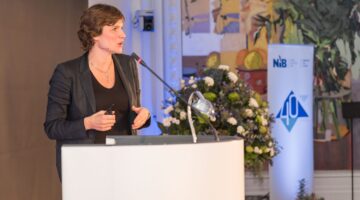NIB anniversary seminar hosts debate on public financing

Photos: Carsten Brix
On 2 November 2016, NIB hosted a seminar entitled “Financing the Future” to celebrate the Bank’s 40th anniversary. The seminar gathered about 140 participants, including state officials and representatives of the business community from the Nordic and Baltic countries. The event hosted a lively debate on future avenues of public financing in the region.
 |
NIB’s seminar was held in connection with the annual session of the Nordic Council and took place in the building of the Folketing, the Danish Parliament, in Copenhagen. In the mid-1970s, the Nordic Council made the decision that gave birth to the Bank. NIB’s event followed a meeting of the Prime Ministers of the Nordic and Baltic countries, the current owners of the Bank.
Finnish Prime Minister Juha Sipilä, who opened the seminar, underlined the role of NIB in the Nordic–Baltic region.
“NIB is not only a child of Nordic co-operation; today, it is also the most tangible institution of the Nordic–Baltic co-operation”, he said in the opening address.
Mr Sipilä acknowledged the Bank’s strong standing in international financial markets, which is supported by the strength of its member countries.
“The Bank’s outstanding lending is about 16 billion euros. This is a large portfolio for a bank with less than 200 employees. Unlike many other international financial institutions, its operations are based on sound banking principles, and it pays a healthy dividend to its owners”, said Mr Sipilä.
He also emphasised the value of the long-term lending NIB provides its customers. Offering “patient capital” (a term borrowed from Professor Mariana Mazzucato), the Bank creates a foundation for synergies between the public and private sectors.
“‘Patient capital’ is a good phrase, since many long-term investments need long-term money. The commercial sector is often ‘impatient’, and innovations that move society forward often require a push from the state. In an ideal situation, ‘the state’ and the ‘commercial sector’ work together. NIB is one of the platforms where this kind of cooperation takes place.”
NIB President & CEO Henrik Normann titled his address “Is there a future worth financing for NIB?” The provocative headline was referring to a depressing picture of the economic crises of recent years and saddening political developments in Europe and worldwide.
“Of all people, we in the Nordic–Baltic region have very good reasons to be optimistic”, said Mr Normann.
“Look at Copenhagen harbour. It was closed to swimming for most of the 20th century. The water was so toxic that you could almost develop photographs in it. Today, Copenhageners are swimming in the city’s harbour”, the NIB President continued.
The situation in the marine environment of the Baltic Sea has also improved, as the discharges of phosphorus and other nutrients into the sea have been significantly reduced over recent decades. The same can be said about CO2 emissions in the region. Today, the level of emissions in the Nordic countries is one-fifth lower than it was forty years ago.
“Most notably, the link between economic growth and greenhouse gas emissions was decoupled”, he said.
In a well-governed, transparent region with innovative economies, there is a future worth financing, the NIB President concluded. “But the progress is not automatic. We need to create strong growth and NIB has the ‘patient capital’ needed to make it happen.”
In her keynote speech to the seminar, Mariana Mazzucato, Professor in the Economics of Innovation at the University of Sussex, discussed governments’ leadership and the role of their innovation policies in shaping the market and creating additionality.
Professor Mazzucato argued that in challenging times when “growth doesn’t just have a rate, it has a direction, such as innovation-led, sustainable and inclusive growth”, public institutions increasingly need to steer growth.
“In those regions that have achieved growth in recent years, there have been networks of dynamic actors in the economy that have been able to work with the private sector and the ‘third’ sector to achieve transformational objectives”, she said.
There is an assumption, Professor Mazzucato continued, that the core role of public policy is to fix failures generated by the market. “We need a different framework in which we justify banks like NIB or any mission-oriented public organisation. There is a need for market making and shaping, not just market fixing.”
Knowledge or a healthy environment are a public good, and this is why investing in science or fixing environmental problems is done by the public sector. The state, according to Professor Mazzucato, needs to move away from the role of creating the background for private “wealth creators” and wealth redistribution towards wealth creation.
In her opinion, a more active role of visionary government and a learning public sector would also help achieve a better balance between the risks, normally “socialised”, and the rewards, normally “privatised”. “Wealth created collectively” may imply “socialising also the rewards, not just the risks.”
“The big technological changes that have affected production and distribution across the whole economy – what we call “general-purpose technologies” – rely on huge public intervention across the whole innovation chain”, said Professor Mazzucato.
In her view, government should be better at telling the story of where the wealth came from. In an entrepreneurial state, wealth and the market have co-created themselves through public investment. Today, re-investment in innovation is scarce.
Therefore, government would need to “create a revolving fund through which wealth can be plugged back in for future investments that will benefit our grandchildren. Public banks can create this revolving fund.” Not doing it will continue to create more inequality in society “in the name of innovation”, said Professor Mazzucato.
The seminar programme was closed by Latvia’s Minister of Finance, Dana Reizniece-Ozola. She commended the Bank’s commitment to supporting sustainable investments and said that financing from NIB is regarded as a stamp of quality for projects like these.
“The Bank is bringing the Nordic–Baltic area together in a very tangible manner by upgrading the transport infrastructure, establishing energy links and promoting closer economic cooperation in the region”, she said.
Ms Reizniece-Ozola highlighted the subject of innovation in the financial sector being very important for Latvia, as the country is currently designing a new financial strategy, “where innovation is a crucial element to defining the future path of the national financial sector and the ultimate dynamic goals.”
“Innovative services, innovation in technology, even innovation in regulatory approach will increase availability of credit for borrowers and create new and less costly ways to raise equity, thus financing the future”, said Ms Reizniece-Ozola.
Thomas Bernt Henriksen, Chief Debate Editor at the Danish daily Børsen, moderated the event.
The texts of the opening address and closing remarks (*check against delivery*) are available here:
Speech of Finland’s Prime Minister Juha Sipilä
Speech of Latvia’s Minister of Finance Dana Reizniece-Ozola
Visit our Flickr account to download hi-res images from the event.
Watch a film about the history of establishing the Nordic Investment Bank. This version of the film was premiered at the NIB Anniversary Seminar.